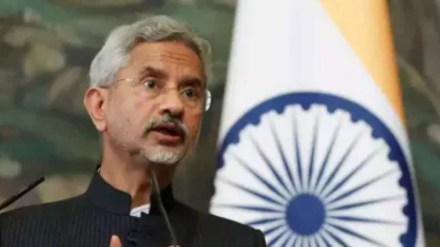External Affairs Minister S Jaishankar on Tuesday said the era when a few powers exercised “disproportionate influence” over the reshaping of the global order is a thing of the past so India and South Korea have a growing responsibility to contribute to the process actively.
Speaking at the Korea National Diplomatic Academy, Jaishankar who is here on a two-day visit, said that India’s partnership with the Republic of Korea is acquiring a greater salience in a more uncertain and volatile world.
“India and South Korea have a growing responsibility to actively contribute to the reshaping of the global order. The era when a few powers exercised disproportionate influence over that process is now behind us,” he said.
“Willy-nilly, it has become a more collaborative and broad-based endeavour. That multilateralism has also stalled and being replaced in good measure by plurilateralism is a factor as well,” he said.
Jaishankar said issues like countering terrorism or Weapons of mass Destruction proliferation or indeed ensuring maritime safety and security matter fundamentally to both nations.
“In recent years, challenges like terrorism and Weapons of Mass Destruction proliferation have impacted our national security. We have learnt to be sensitive to changing currents of the global order. While our solutions may be suited to our particular national circumstances, working together has always been to our common advantage,” he said.
Underlining that the Indo-Pacific region has emerged as a consequence of geo-political shifts in the last few decades, he said as challenges changed and capabilities were stretched, a more cohesive effort was needed not only in respect of its own resources but working with more partners as well.
“India’s stakes in terms of trade, investment, services, resources, logistics and technology in the Indo-Pacific are growing by the day. Ensuring the stability, safety and security of this region is therefore vital for us. We have an obligation to the global commons, just as we have a duty to do global good,” he said.
To realise their potential, Jaishankar said it is important that the two nations intensify their engagement in different spheres.
He said that the two nations need more political discussions and more strategic conversations.
“We need stronger business connections and technology interactions. The long pending review of our CEPA must be expedited so that it can be upgraded. We will have to identify more intersections and meeting points that work for both of us,” he said.
“We will also have to be more collaborative, recognizing the strengths that we each bring to the table. Today, we are all contemplating the prospect of a re-globalisation that would be very much shaped by emerging technologies. That gives our two nations the opening to progress while contributing to a better world,” he said.
He said he was confident that by broadening their horizons, the India-South Korea partnership could emerge as a significant factor in the Indo-Pacific.
Noting that India has its own semiconductor mission as it does initiatives in many other new and emerging technologies, he said, “Our expectation is that even within a few years, a very different larger ecosystem will take shape in India. I am sure that it will create more possibilities for collaboration between India and the Republic of Korea.” “Let me add here that even as we seek to strengthen our bilateral ties, there are a number of international initiatives in which our shared participation would certainly contribute to the bilateral facet of our relationship as well,” he said.
“We have also seen opportunity in initiatives like the Indo-Pacific Economic Framework or the Minerals Security Partnership. In crucial domains like digital delivery or clean energy, our national efforts have points of convergence,” Jaishankar said.
“Our ties have been described as a Special Strategic Partnership since 2015. This is not just a phrase but an assessment to which we have tried to live up to since then. In different domains, cooperation has expanded and benefits are visible. Yet, this is also a time to introspect and strategize how we could be doing more by doing differently,” he added.
Noting that in recent years, Prime Minister Narendra Modi and President Yoon have met twice, as he did with his previous counterpart, Jaishankar said that the India-Korea partnership is significant but even more so when they look at its impact on the Indo-Pacific.
The trade between the two sides is roughly around the USD 25 billion plus-minus level, he said, noting that the defence cooperation recorded success in the joint efforts of Hanwha and L&T.
“In the last four years, we have seen the global economy and even global society devastated by the Covid-19 Pandemic… Thereafter, we are witnessing two conflicts that are still ongoing, one in Ukraine and the other in the Middle East. The latter has spread to the Red Sea, threatening maritime shipping between Asia and Europe,” he said, voicing concern over the volatile situation.
“Climate events are another variable that we need to cater for, because they will happen increasingly frequently. The world cannot be sanguine about such shocks in the future,” he said.
He added that data privacy and cyber security are increasingly crucial concerns, for nations as much as for individuals. “It is not enough to come up with reactive steps or preventive firewalls. There are structural solutions that are based on trusted vendors and trusted geographies. We have to recognise the imperatives of strategic trade and adjust our policies accordingly.” From India’s viewpoint, it is essential that there is a lateral connect from the Pacific to the Atlantic that passes through our country, he said, adding that this could well take shape when the India Middle East Europe Economic Corridor initiative gathers pace to the West of India in the Gulf and beyond and as the trilateral highway connects India all the way to the Vietnam coast.
